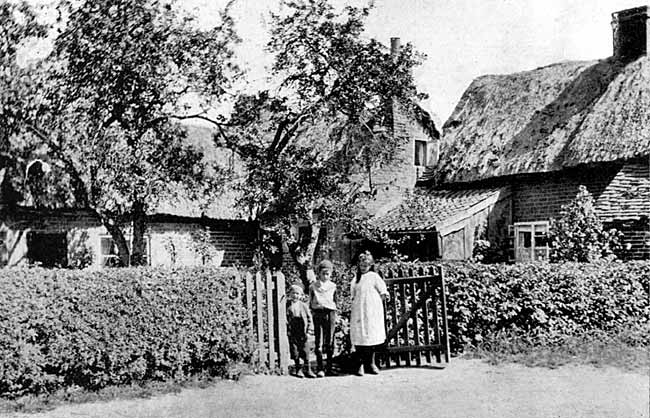CHAPTER V. Two characteristic poets.
SIR JOHN BEAUMONT.
Sir John was born in 1583, and his chief work "Bosworth Field" was published two years after his death which happened in 1627, the year after Charles I. made him a baronet. He deals at length with the old traditional understanding between the Cliftons and the Byrons of Newstead, who, though warmly attached to each other in affection, were on opposite sides in the Wars of the Roses. Beaumont says that Sir Gervase Clifton was slain at Bosworth Field, fighting on Richard's side against the Duke of Richmond (King Henry VII.) and that Byron, though on the other side, procured the restoration of his lands to his son.
Here are some of the lines written nearly 300 years ago:—
"Recount, thy muse, how Byron's faithful love.
To dying Clifton did itself approve
For Clifton lighting bravely in the troop.
Receives a wound and now begins to droop.
Which Byron seeing though in arms his foe
In heart his friend and hoping that the blow,
Had not been mortal guards him with his shield
From second hurts and cries ‘Dear Clifton yield.
Take this my counsel.' 'Clifton' thus replied.
It is too late for I must now provide.
To seek another life, live thou. sweet friend
And when thy side obtains a happy end,
Upon the fortunes of my children look.
Remember, what a solemn vow we took,
That he whose part should prove the best in fight
Would with the conqueror try his utmost might
To save the other's lands from rav'nous paws.
Which seize on fragments of a luckless cause.'
Testimony is not wanting that the solemn undertaking between the two families was something more than subject for Sir John's muse.
KIRKE WHITE.
The Poet of Clifton.
Henry Kirke White was born at Nottingham in 1785, his father being a butcher. He was a youth of extraordinary genius, and both as a speaker and writer, gave abundant promise of being a man of almost unique power. Unfortunately physical weakness which was accompanied by deafness and extreme nervousness culminated in his early death at the age of 21, just when the prospect of a brilliant career at the University of Cambridge was becoming almost assured. A poem written when he was but 16 and entitled "Clifton Grove," he himself called his principal Poem. It contains about 500 lines and some of them are full of singularly musical and suggestive thoughts.
Here are a few lines:—
"The pale mechanic leaves the labouring loom,
The air-pent hold, the pestilential room,
And rushes out, impatient to begin
The stated course of customary sin,
Now, now. my solitary way I bend
Where solemn groves in awful state impend
And cliffs that boldly rise above the plain.
Bespeak, blessed Clifton, thy sublime domain
Here lonely wandering o'er the sylvan bower,
I come to pass the meditative hour."
He incidentally tells of the far-famed Clifton maid, the beauteous "Margaret," who is traditionally supposed to have been a descendant of the old de Rhodes family and to have lived during the wars of the Roses in a house on the position of that now occupied by Mr. Royce Turner.
How she bartered the love of her faithful "Bateman" while
he
"For three long years by cruel fate's command Was bound to languish in a
foreign land; "
—although she had previously bidden, if she proved faithless:—
"The fiends of hell and every power of dread.
To come and drag me from my perjured lied.
And hurl me headlong down these awful steeps,
To find deserved death in yonder deeps."
Then he explains how Germaine, the tempter came,
"Who offered wealth, and all the joys of life
And the weak maid became another's wife."
The weird sequel of this tragic legend he tells with a power that is most remarkable when we remember the age of the writer. It would be well to read it as he tells it, but I may so far recall the plot of the legend by adding that six months after her wedding, "Bateman" returned bearing the encased heart of Sir Wm. Clifton, a crusader, who had died in France, to be laid to rest among his ancestors, heard the fatal news, and after a prayer for forgiveness, threw himself into the calm, deceitful, current of the Trent at the dead of night. A few more months of remorse for the perjured "Margaret," and then on the night after the birth of Germaine's heir, the fell demons bore her "to the yawning wave, her own and murdered lover's mutual grave."
This tale, Kirke White continues,
"Sheds a fairy lustre on the floods
And breathes a mellower gloom upon the woods,
This, as the distant cataract swells around.
Gives a romantic cadence to the sound.
This and the deepening glen, the alley green.
The silver stream, with sedgy tufts between.
The massy rock the wood-encumbered leas.
The broom-clad islands and the nodding trees
The lengthening vista, and the present gloom.
The verdant pathway breathing waste perfume.
These are thy charms, the joys which these impart.
Bind thee. blessed Clifton, close around my heart."
The gifted boy's tribute to the charm of Clifton Grove voices a sentiment which many have endeavoured to express since; but few, if any, have succeeded in excelling him.

A Glapton cottage. Occupied by Mr Mann, a gardener to Colonel Bruce.
